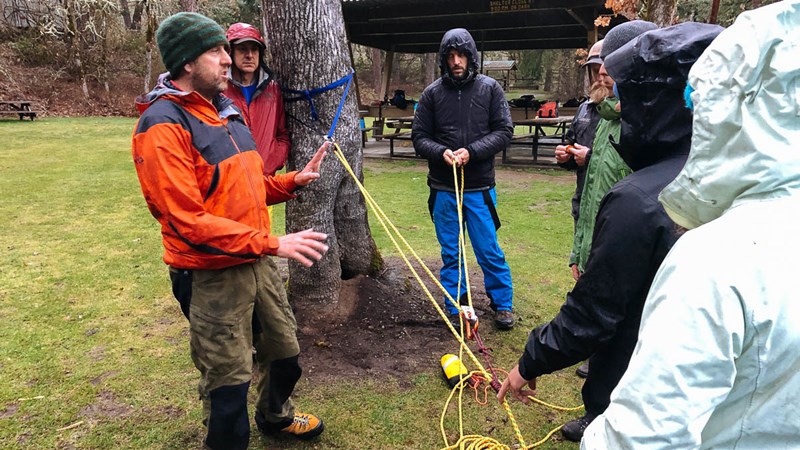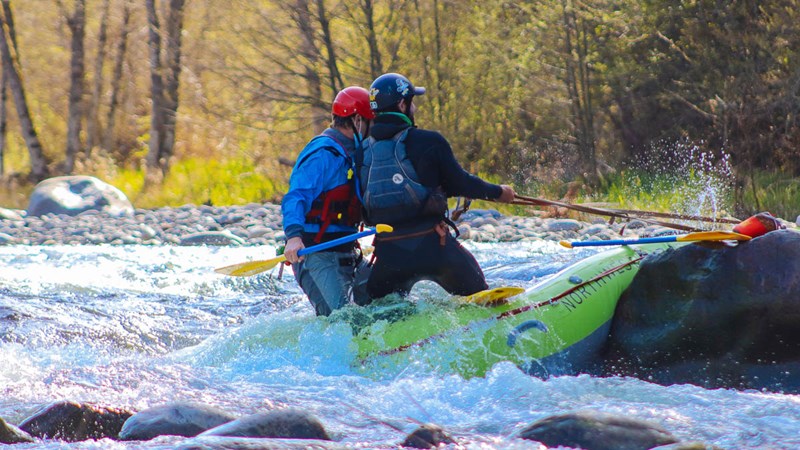By: Zach Collier, Northwest Rafting Company
Some wonderful courses are available that guides can take for additional training. The advantages of these trainings include the following:
-
They cover specialized information that your in-house instructors may not have
-
They explore modern techniques and new equipment
-
They are taught by professional instructors who are effective and practiced teachers

Whitewater Rescue
We have historically sent our guides to “swiftwater rescue” courses, which focus on land-based techniques developed by first responders. I suggest having guides trained on “whitewater rescue,” which focuses on techniques that take advantage of guides’ swimming and boat-handling skills. These courses ideally use a curriculum developed by river guides and are taught by experienced river guides.
First Aid
The Wilderness First Responder (WFR) Course has become the gold standard for river guides, especially for multi-day river guides. No governmental agency sets minimum standards for WFR courses, so the Wilderness Medical Education Collaborative was formed to set minimum standards. The minimum standards are as follows:
-
A minimum of 70 hours of training
-
Hybrid courses require a minimum of 45 hours of in-person training
-
At least 50% of the time should be spent doing practical scenarios
-
There should be a final written exam and practical skills checkoff
-
The curriculum should follow core topics in “Industry Standards for WFR Certification”
Most reputable WFR courses will require more than the 70-hour minimum.
A number of organizations that teach WFR courses have agreed on “reciprocity” for recertification. This means that if you take a course with one organization, these other organizations will honor the original course and renewals. Here is a list of organizations that have agreed upon reciprocity:
-
Aerie Backcountry Medicine
-
Desert Mountain Medicine
-
Longleaf Wilderness Medicine
-
NOLS Wilderness Medicine
-
Remote Medical Training
-
Sierra Rescue
-
SOLO Wilderness Medicine
-
Wilderness Medical Associates International
-
Wilderness Medicine Training Center
If your organization does half-day, single-day, or low-risk multi-day trips with good emergency communication and accessible evacuation points, you may also consider the Wilderness Advanced First Aid (WAFA) Courses. The WAFA courses have a 36-hour minimum training requirement.

International Rafting Federation GTE Workshops
The International Rafting Federation (IRF) established its Guide Training and Education (GTE) program in 1998 and updated it in 2016. This program sets minimum standards for river guides and instructors and is used around the world.
The IRF GTE workshops for river guides are designed to evaluate experienced guides and provide additional training to meet the minimum standards at an international level. Guides can earn awards in Levels 2 through 4 and receive detailed feedback with areas for improvement.
Critical Incident Response Training (CIRT)
This new online course offered by Recreation Law Group trains guides, office staff, and outfitters to manage critical incidents, such as serious injury or death.
Conclusion
First aid, rescue, IRF, and CIRT courses are intended to supplement the in-house training you offer your guides. The key is finding a solid organization and/or instructor that can offer engaging courses with modern training.
About the author
Zach Collier is the owner of Northwest Rafting Company, offering multi-day trips around the American West and a few select international destinations. He is also an International Rafting Federation raft guide, trip leader, and safety kayak instructor.